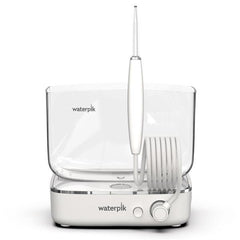Waterpik vs Electric Toothbrush | Cheeeese

What makes it difficult for you to choose between a Waterpik (water flosser) and an electric toothbrush? Whether you are looking for a water flosser or an electric toothbrush, Waterpik has all the options. You haven’t made up your mind because you are most likely not convinced to choose a Waterpik combo. We know why and you are seeking objective recommendations. We don’t want you to be overwhelmed with many options, so we are going to talk about water flosser vs electric toothbrush in this post. You will find helpful information to make the right decision.
Problems a water flosser and an electric toothbrush solve.
· Water flosser:First of all, let’s not argue whether Waterpik is number one in water flossing worldwide. Clinical research shows that a water flosser can effectively remove dental plaque and food particles between teeth. The concept of water flossing is to make dental plaque removal easier, especially for those who have sensitive gums or dental appliances. However, this doesn’t mean every water flossing product has the same cleaning effectiveness at plaque removal.

The effectiveness is subject to the water pressure range. To effectively remove plaque, the pressure must be at least at a 70 PSI (pound per square inch). So, pressure ranging from 10 – 100 PSI is essential to meet different flossing needs.
· Electric toothbrush:
An electric toothbrush is powered with multiple vibrations to do a better tooth-brushing job than a manual toothbrush. Unlike a water flosser, an ultrasonic toothbrush does various cleaning jobs under different brushing modes. As part of your oral health maintenance, an electric toothbrush has its unique benefits that can’t be replaced by a water flossing product, such as its high effectiveness at coffee/tea/wine stains removal on your teeth.
Other than that, an electric toothbrush vibrates or oscillates to significantly remove food particles and dental plaque, which helps prevent gum diseases and cavities.
Pros and Cons
Indeed, brushing your teeth twice every day is not enough to maintain your dental health. Dentists recommend at least flossing your teeth once per day to prevent plaque from forming tartar (a hardened calcified deposit) that can’t be brushed or flossed away.
Waterpik and electric toothbrushes have different benefits to your oral hygiene. If you have to make a choice, here’s what you should know.
· Water flosser:
Pros:- Friendly to those who have appliances like dental braces or spacers.
- Easier to floss away debris in the gums.
- Water can go into small gaps where string floss can’t.
- More expensive than an electric toothbrush on average.
- Can’t floss away food particles that get stuck between teeth or under gums. A string floss does a better job.
- Can’t floss away the coffee/tea/wine stains.
- Can’t remove tartar.
- Takes up more of your space.
Taking these into consideration, a water flosser is less likely the best option to maintain your dental in good condition, even though a manual toothbrush can do the general cleaning job.
· Electric toothbrush:
Pros:
- Cheaper than a water flosser on average.
- Multiple brushing modes to meet different cleaning needs.
- Under gum care and cleaning modes, bristles effectively remove biofilms on the gum lines and brush away food debris between teeth to prevent dental plaque from forming tartar on the gums.
- Under whitening mode, toothbrush bristles are highly effective at coffee/tea/wine stains removal.
- Different brush heads to achieve specific results.
- Ultra-soft bristles are perfect for sensitive gums and can significantly brush away biofilm and other debris in the smallest gaps and gums.

Cons:
- More expensive than a manual toothbrush.
- Requires recharging frequently.
- Cost of brush head replacements: require changing every 3 months.
Flexibility
· Water flosser:
Due to the nature of the functions a water flosser serves, it’s near impossible to make it completely portable compared to a toothbrush. As a result, it can be a burden when you are on the road. But if you don’t mind, Sidekick seems possibly the only option considered flexible.
· Electric toothbrush:
Compared to water flossing products, flexibility is what an electric toothbrush is about. Most electric toothbrushes are lightweight and slim, and battery life is a significant fact that distinguishes the premium range from medium and budget product lines. It seems two-week battery life has become the entry-level for a powered toothbrush in dental care.
However, two-week battery life can no longer meet the market needs. Ambitious small dental care brands understand that travel electric toothbrushes are what today’s consumers look for. Long-lasting battery life is the key to gaining a bigger market share in addition to an excellent brushing experience.
Conclusion
It’s difficult to say which one is better as water flossing products and electric toothbrushes serve different functions. Of course, the ideal combination is water flosser, electric toothbrush, and string floss.
If you have to make a decision between a water flosser and an electric toothbrush, here’s the objective recommendation:
Whether you would use a water flosser, a combination of an electric toothbrush and string floss is essential for a daily dental care routine.
Electric toothbrush brushes away most food debris, removes coffee/tea/wine stains from teeth, and string floss removes food particles that get stuck between teeth, while water flosser is only effective at dental plaque removal.




